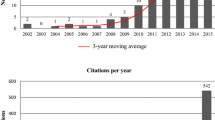Abstract
Using data from the 2004 and 2005 Consumer Expenditure Surveys (CES) comprising of 15,000 respondents, this study examines two research questions. The first of these considers the demographic differences between households whose members lose money playing the lottery and/or engaging in pari-mutuel betting and those whose members do not lose money participating in such activities. The second assesses demographic differences among households whose members lose money playing the lottery and/or engaging in pari-mutuel betting. It was found that respondents living in money-losing households are slightly older, better off financially, more likely to be married or divorced, more likely to live in a state with at least one legal casino and more likely to live in the Northeast than respondents living in non-money-losing households. Among those living in money-losing households, the least wealthy and African American respondents are more likely to lose a higher proportion of their respective incomes purchasing lottery tickets and engaging in pari-mutuel betting than wealthier respondents and whites.
Similar content being viewed by others
References
Blakey, G. R. (1979). State conducted lotteries: History, problems, and promises. The Journal of Social Issues, 35, 62–86.
Browne, B. A., & Brown, D. J. (2001). Predictors of lottery gambling among American college students. The Journal of Social Psychology, 134, 339–347.
Burns, A. C., Gillett, P. L., Rubinstein, M., & Gentry, J. W. (1990). An exploratory study of lottery playing, gambling addiction, and links to compulsive consumption. Advances in Consumer Research. Association for Consumer Research (U. S.), 17, 298–305.
Freund, E. A., & Morris, I. L. (2005). The lottery and income inequality in the States. Social Science Quarterly, 86, 996–1012. doi:10.1111/j.0038-4941.2005.00333.x.
Gribbin, D. W., & Bean, J. J. (2006). Adoption of state lotteries in the United States, with a closer look at Illinois. The Independent Review, X, 351–364.
Hansen, A. (2004). Lotteries and state fiscal policy. Tax Foundation Background Paper, 46, 1–36.
Kaplan, H. R. (1984). The effects of state lotteries on the pari-mutuel industry. Journal of Gambling Studies, 6, 331–344. doi:10.1007/BF01014588.
Marler, L. G., & Berney, R. E. (1973). Demographic information on parimutuel betters with implications for tax incidence. The Annals of Regional Science, 7, 88–99. doi:10.1007/BF01285533.
McConkey, C. W., & Warren, W. E. (1987). Psychographic and demographic profiles of state lottery ticket purchasers. The Journal of Consumer Affairs, 21, 314–327.
McGowan, R. (1994). State lotteries and legalized gambling: Painless revenue or painful mirage?. Westport, CT: Praeger.
Meinert, D. B., Lumpkin, J. R., & Reich, R. V. (1989). Public opinions toward state lotteries: A comparison of non-player and player views. Journal of Social Behavior and Personality, 4, 481–490.
Mikesell, J. L. (1990). Lotteries in the state fiscal system. Journal of Gambling Studies, 6, 313–330. doi:10.1007/BF01014587.
Mobilia, P. (1992). A little bit more evidence of lottery regressivity: The Kansas state lottery. Journal of Gambling Studies, 8, 361–369. doi:10.1007/BF01024123.
Sauer, R. D. (1998). The economics of wagering markets. Journal of Economic Literature, XXXVI, 2021–2064.
Terrell, D. (1994). A test of the gambler’s fallacy: Evidence from pari-mutuel games. Journal of Risk and Uncertainty, 8, 309–317. doi:10.1007/BF01064047.
Thalheimer, R., & Ali, M. M. (1992). Demand for parimutuel horse race wagering with special reference to telephone betting. Applied Economics, 24, 137–142. doi:10.1080/00036849200000112.
Thompson, W. (2001). Gambling in America: An encyclopedia of history, issues and society. Santa Barbara, CA: ABC-CLIO.
United States Bureau of the Census. (2005). Income and apportionment of state-administered lottery funds: 2004. http://ftp2.census.gov/govs/state/04lottery.pdf. Retrieved 20 May, 2008.
United States Bureau of the Census. (2006). Income and apportionment of state-administered lottery funds: 2005. http://ftp2.census.gov/govs/state/05lottery.pdf. Retrieved 20 May, 2008.
United States Bureau of the Census. (2007). Income and apportionment of state-administered lottery funds: 2006. http://ftp2.census.gov/govs/state/06lottery.pdf. Retrieved 20 May, 2008.
Welte, J. W., Barnes, G. M., Wieczorek, W. F., Tidwell, M.-C., & Parker, J. (2002). Gambling participation in the U.S.—results from a national survey. Journal of Gambling Studies, 18, 313–337. doi:10.1023/A:1021019915591.
Wisman, J. D. (2006). State lotteries: Using state power to fleece the poor. Journal of Economic Issues, 4, 955–966.
Young, R. D. (2004). State lotteries: History, practices, issues and the South Carolina educational lottery. Columbia, SC: University of South Carolina College of Liberal Arts’ Institute for Public Research and Policy Research.
Acknowledgments
This research was funded by Bloomsburg University’s Department of Sociology, Social Work and Criminal Justice. The authors wish to thank their department for its financial assistance. They would also like to thank Brian Kincel, a research assistant for this project, for all of his efforts.
Author information
Authors and Affiliations
Corresponding author
Rights and permissions
About this article
Cite this article
Lang, K.B., Omori, M. Can Demographic Variables Predict Lottery and Pari-mutuel Losses? An Empirical Investigation. J Gambl Stud 25, 171–183 (2009). https://doi.org/10.1007/s10899-009-9122-3
Received:
Accepted:
Published:
Issue Date:
DOI: https://doi.org/10.1007/s10899-009-9122-3




